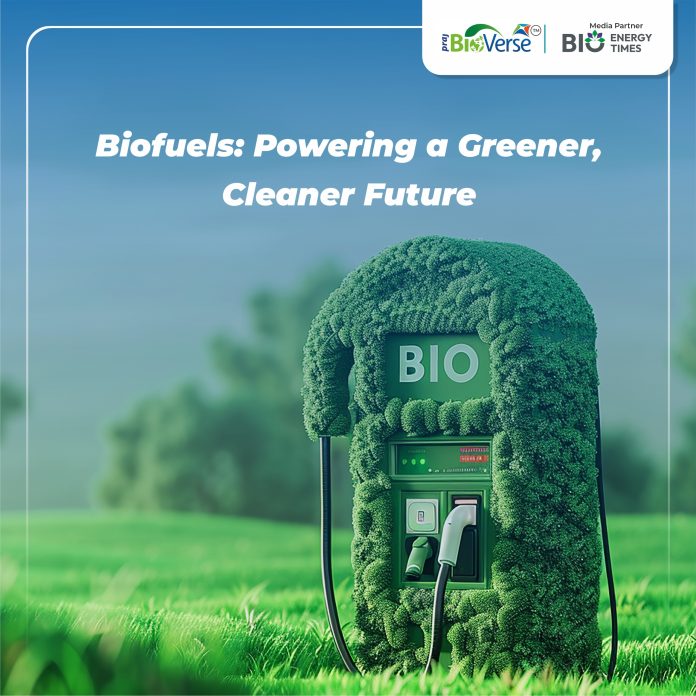As the world grapples with the twin crises of climate change and energy security, biofuels have emerged as a vital component of the global shift toward sustainable energy. Derived from organic materials such as sugarcane, crops, agri residue and waste, or dedicated crops, biofuels offer a renewable alternative to fossil fuels. India, with its vast agrarian economy and ambitious climate goals, is uniquely positioned to lead this transition. But what exactly are biofuels, and how can they reshape our energy future?
Biofuels are fuels produced from biological sources—either directly from plants or indirectly from agricultural, commercial, domestic, or industrial waste. Unlike fossil fuels, which take millions of years to form and release locked-up carbon when burned, biofuels are part of a short carbon cycle, making them more climate-friendly.
The most prominent types of biofuels include Bioethanol, Biodiesel, Compressed BioGas (CBG), and Sustainable Aviation Fuel (SAF). Each plays a specific role in decarbonising sectors like transport, industry, and aviation.
Bioethanol
Bioethanol, produced from sugarcane, maize or broken rice, is promoted under India’s Ethanol Blending Programme (EBP) to cut crude-oil imports and reduce vehicular emissions. It’s blended with petrol for use in internal-combustion engines across two-wheelers, cars and commercial vehicles (e.g., E10, E20).
Biodiesel
India’s biodiesel mandate of 5% blending in fossil diesel, launched in 2018, even before the Ethanol Blending Programme (EBP), has remained largely aspirational. Real-world uptake stalled at ~0.75–0.8%, held back by persistent feedstock challenges.
A practical, high-impact solution is now available. With the Indian Government encouraging corn-based ethanol, its valuable co-product Distilled Corn Oil (DCO) — is becoming available at scale and is an ideal feedstock for producing biodiesel.
DCO-derived from corn ethanol production process blended with fossil diesel creates a realistic, near-term pathway to deliver up to 5% Blending— unlocking cleaner fuel, strengthening agri value chains, and cutting transportation emissions. Fast-track DCO certification, scale up field trials with OMCs/OEMs, and integrate these options into blending mandates to convert policy intent into measurable action.
The government is already considering DCO for this purpose. Simultaneously, OMCs, technology providers and OEMs are trialling bio-C4 alcohol blends (isobutyl alcohol -IBA in diesel) to find promising results in diesel blends.
Compressed BioGas (CBG)
CBG is purified biogas, primarily composed of methane, produced through the anaerobic digestion of organic waste such as cattle dung, agri-residue, or municipal solid waste. It is chemically similar to CNG (compressed natural gas) and is already being marketed in India under the SATAT (Sustainable Alternative Towards Affordable Transportation) initiative.
CBG is ideal for use in CNG vehicles and for household or industrial heating, helping to reduce methane emissions from waste, promoting the circular economy, and providing a decentralised energy source for rural areas.
Sustainable Aviation Fuel (SAF)
SAF is a drop-in replacement for existing aviation turbine fuel with no engine modifications required. SAF is made predominantly from Alcohol-to-Jet (ATJ) technology, and waste oils can cut lifecycle GHG emissions by roughly 50–80% versus conventional jet fuels.
There are several benefits to biofuels, as they emit fewer greenhouse gases and pollutants compared to conventional fuels. Biofuel production creates employment opportunities in farming, logistics, and processing, directly benefiting rural economies.
The future of energy is not just about being renewable; it must also be inclusive, decentralised, and sustainable. Biofuels check all these boxes. As technologies improve and policies stabilise, biofuels can lead India and the world toward a cleaner, more resilient energy ecosystem. Investing in biofuel infrastructure today is an investment in a greener tomorrow.














